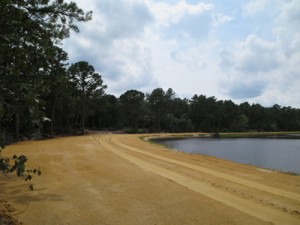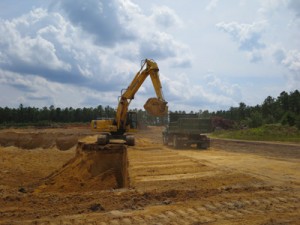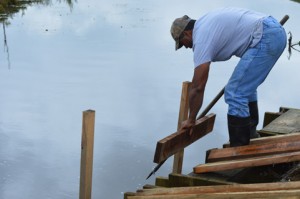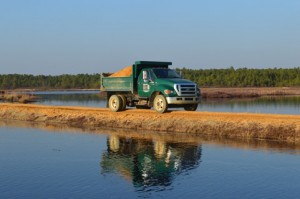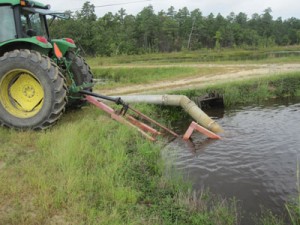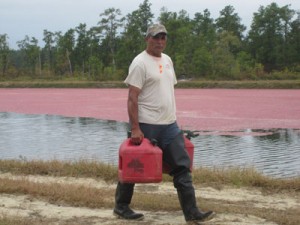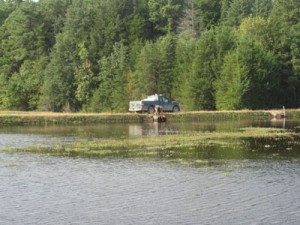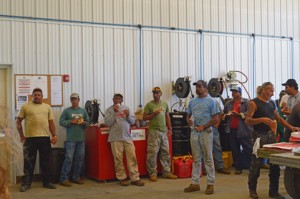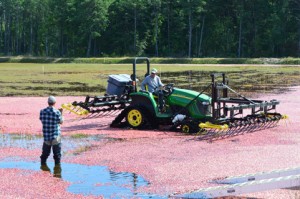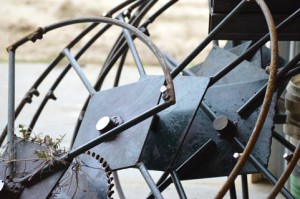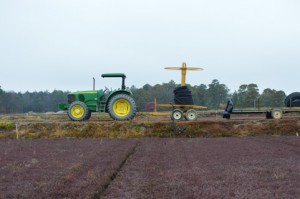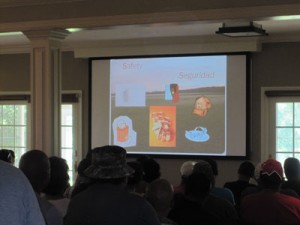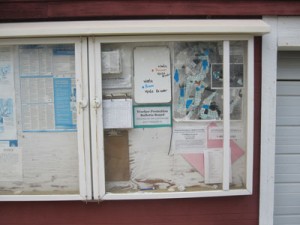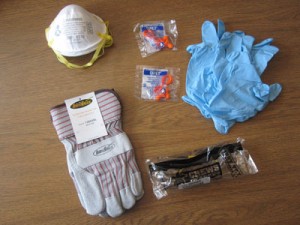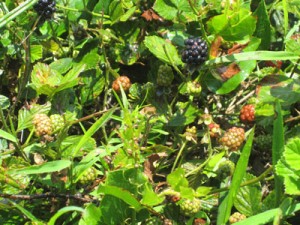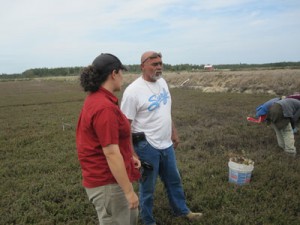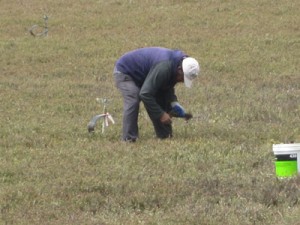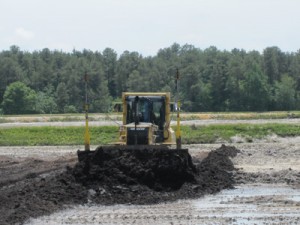Pine Island Cranberry’s strategic plan includes this definition of our Core Values (Whatever It Takes, Continuous Improvement, Protect the Enviroment, Continuous Growth, We are Growers, and Provide Opportunity): “Core Values are what we expect of ourselves and one another.” Nowhere were these more evident than when a problem arose on Monday night.
At 5:30 P.M., after most of our team had finished the day and gone home, a fuel-truck operator, out topping off equipment, backed down a tough dam…and got too close to the edge, getting stuck, and almost tipping over into the bog. This can happen with any one of our trucks, and in most cases, all it takes is a single operator on another piece of equipment to pull the truck off the edge and set things in motion again. Unfortunately, in this particular instance our team was not dealing with a dump truck with a load of sand, but a fuel truck with 2400 gallons in its tank. The operator alerted the equipment team, who immediately called out Junior Colon, our usual go-to in cases like this. Junior took one look at the scene, and immediately said, “Call Louis; this is going to need more people.”
“It was bad; the worst I’ve seen,” says Louis. “I mean, equipment goes off the dam, but this wasn’t a load of dirt; it was 2400 gallons of fuel. The big issue was: ‘What do we do if this tips over? What happens then?’ We had to come up with a plan for the worst-case scenario immediately, because if things did start to go bad, there’d be no time to come up with one later.” So while supervisor Carlos Baez worked with Louis to empty our second fuel truck into a 2000 gallon tank (that Louis keeps empty in building 0-3 for just these occasions) and Junior Colon and Mickey Mercado went to our current sanding location to “borrow” two excavators, Gerardo Ortiz started blocking off the water, and Louis called Matt Giberson to put two more drivers on stand-by.
“Louis called me and I drove out right away,” says Gerardo. “I saw the truck had started to go in, so the first thing we did was we close that canal so water couldn’t go to the swamp and spread out. Then we closed off the top to keep the rest of the water in place so we could do something with the oil if we needed to. We were worried if the truck went completely over that we’d lose the oil to the swamp and then from the swamp to the river, so we had to contain it right away. Luckily the dam was hard enough to support the truck; any softer and it would have been a different story.”
The dam had Louis concerned as well. “It took us a long time to empty the spare truck back at the shop, and then we still had to get out to the site to re-start and empty the one that went over. That’s a lot of extra weight; those trucks are top heavy. The waiting is tough; you don’t want to lose dirt. So while all this was going on we had Gerardo shutting the water off, we were planning to get a Crisafulli in, we were dealing with upstream water…all that worst case scenario planning, because if it did go bad there would be no time. Thankfully, it all worked out okay. But that’s the furthest I’ve ever seen the truck leaning over.”
About 9:30, four hours after the truck went off the dam, our team had the truck pulled out and were finally able to go back home. Carlos, Junior, Mickey, Gerardo, and Louis truly pulled together quickly, no questions asked, and immediately did whatever to took to solve the immediate problem as well as working out a plan to provide for several different outcomes and protect our water supply and our environment. “These guys are the best,” says Louis. “When things hit the skids, everyone here just puts their head down and leans into the work. They don’t ask questions; when you call and say you need them, they just say, ‘I’m on my way’.” Carlos agrees: “It was bad that we had to go out there at all, but it was good that everyone did what they had to do, and nothing bad came out of it.”
The next immediate step for our team, however, is making some changes so that nothing like this happens again. Or, as supervisor Matt Giberson puts it, “We need to figure out how to make it better. Louis is great at this stuff; when a situation comes up, he gets everything under control and takes care of it. He called me to have two additional drivers on stand-by, which turned out not to be necessary, but shows a lot of thinking ahead.” One of the solutions, he says, is to work out a re-fueling schedule that avoids sending anyone out at night. In addition, he and Louis worked out some other details that will help avoid incidents and still keep the equipment running smoothly. Some of these solutions include making sure that heavy equipment is moved to locations that are reasonably accessible to the fuel truck (without running it in reverse) and utilizing a bulk truck to fuel small equipment (some of which could be done during the day without shutting that equipment down or stopping it). Louis and Matt have also proposed adding small transfer tanks with 12 volt pumps to two or three crew leader or supervisor trucks that would allow fueling of small equipment without the use of the 5 gallon cans or a bulk truck.
CEO Bill Haines was pleased with the team’s efforts Monday night. “It’s clear the team members that came out Monday have our core values embedded in their hearts, even if they can’t repeat them word for word. They put three of them into action this week: they showed they will do whatever it takes by working in the rain and the dark to get the fuel truck back on the dam; they planned and organized to protect the environment in case the worst happened; finally, they are already looking for continuous improvement by changing our procedures so this doesn’t happen again. I’m proud of all of them.”

